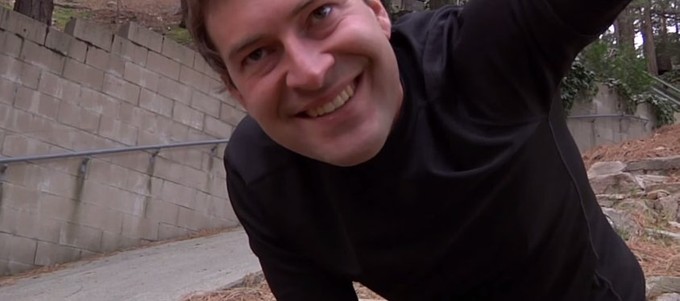
When you think of Mark Duplass, you probably don’t immediately think CREEP.
But sure enough, he plays the titular character in Patrick Brice’s debut film, which only features two speaking parts: Brice and Duplass. Brice mans the camera, as well as playing Aaron, an ambitious videographer who responds to a vague Craiglist ad promising a healthy sum of money for the simple task of following this guy around for a day, with full discretion. He meets Duplass’ Josef, who seems pleasant enough, and he tells Aaron that he’s dying, and wants to leave some life lessons on tape for his unborn son. He goes back with Josef to his secluded cabin in the woods, and the more time he spends with this bizarre, yet amiable guy, the less certain he is as to Josef’s intentions and to the veracity of his claims.
While it’s a two-hander, it’s Duplass' Josef (the subject of Aaron’s camera) who’s onscreen for most of the film, and he takes the character to places that he hasn’t really traversed in either his acting (THE LEAGUE, SAFETY NOT GUARANTEED) or directing (CYRUS, JEFF WHO LIVES AT HOME) work to date. The two crafted this film in an unconventional, highly intimate environment (which they detail below), and the result is something you can’t quite call comedy and you can’t quite call horror, but a unique, tantalizing mixture of the two. It’s like the interactions between John C. Reilly and Jonah Hill in CYRUS kicked up to 11, with a secluded cabin, a dark and scary night, and one particularly creepy wolfman mask to send it all home.
I was only scheduled to speak with Mark, but I was lucky to discover that Patrick had accompanied him that morning, so I got to speak with both of them about how they came up with this weird idea, the long process of shaping it into its current form, and the film they followed this up with, THE OVERNIGHT:
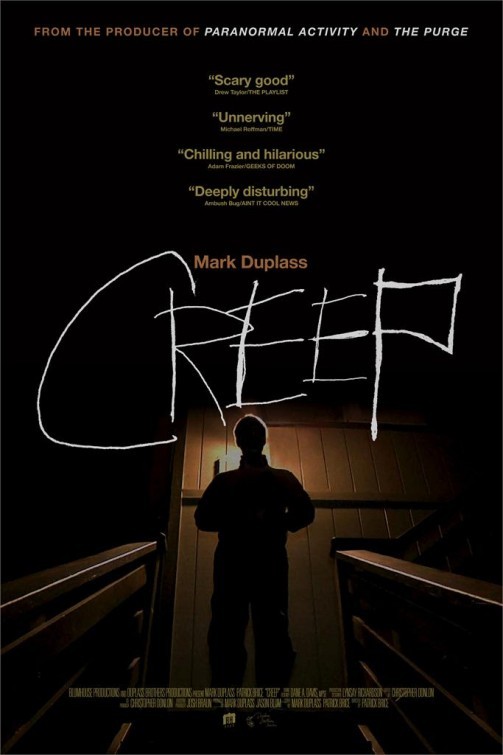
VINYARD: How did this start? You guys wrote the script together. Did you guys know each other previously?
PATRICK: I moved to L.A. to go to CalArts. I was living in the Bay area and wanted to finish up as a transfer student at CalArts, so I moved here about 2008, 2009. My girlfriend had just graduated from Berkley, and the first job she got when she moved out to L.A. was being Mark’s nanny…for his daughter.
DUPLASS: My nanny for me, personally.
PATRICK: So we just became friends through me just kinda coming over and hanging out at the house. We watched THE BACHELOR together.
DUPLASS: And THE BACHELORETTE.
PATRICK: And THE BACHELORETTE. We didn’t discriminate.
DUPLASS: *in pretentious voice* We watched some cool indie movies too.
PATRICK: So it was just kind of an organic friendship out of that. I went off to Paris for three months where I made my thesis film for school, which was this documentary about the last porn theater in Paris that still plays 35mm film. I came back and showed that to Mark, and he really dug it. We were starting to have conversations about potentially making something together, and it was out of that that the initial idea for CREEP came about.
VINYARD: So you guys came up with this as something for you guys to act in, or-
DUPLASS: Yeah, to do together. It’s hard to think about it, because when you think about it in a traditional way, it doesn’t make sense. You gotta think of it as more of an arts-and-crafts project. “Let’s go to a cabin and make a movie together,” like two five-year-olds. “You hold the camera, and I’ll be in front of the camera, and we’ll make this movie!”
PATRICK: That’s kind of how this found footage form came into it. That was something that enabled us to make a movie like this.
DUPLASS: I’d been making some mid-sized studio movies, and I was looking to kinda cut loose and do something fun and free and puerile. I’d had this original idea of maybe trying to do a movie completely by myself at some point, and I was like, “That’s gonna be completely boring.” Patrick and I really love odd behavior and odd people, and we started talking about weird encounters we’d had. He’s extremely sensitive to people’s energy when they enter a room, and I’m very sensitive to it, but he’s probably even more so than I am. We just kinda clicked in.
The way he found Maurice- who was the protagonist of his thesis film, the guy who ran the porn theater- Patrick has so much empathy as a person, and he’s so inviting as a person, that Maurice just came forward into the camera with all of his strangeness, because he knew Patrick would celebrate that for him. So we’re like, let’s use that energy and amplify it. Make him even more sycophantish. Then for my character, let’s make him someone who could really take advantage of that and use that same quality that I see in people and that exists in me a little bit, which is a people pleaser who knows how to go into a room and adjust the way they behave a little bit just to make them feel comfortable, and blow it up. Magnify it huge. And if we put these two together, it’s like, “Oh, this is sounding like the good versions of FATAL ATTRACTION and MISERY” and what this could be started bubbling.
So instead of sitting down and writing the script to try and sell it, we were like, “Let’s go to this cabin and let’s come up with an outline for like two days, and for the week after that we’re gonna shoot and we’ll see what we get.” And that’s how it started. Then eighteen months later, reshooting, editing, reshooting, editing, partnering with Blumhouse, reshooting, testing, then we had the movie.
VINYARD: What’d you guys have to reshoot?
DUPLASS: Everything. At least half the movie, for sure.
VINYARD: So it wasn’t filling in scenes you didn’t have.
DUPLASS: It was rewriting and reshooting. You have to understand, there wasn’t a formal script. There was like a five-page outline, so we were like, “Let’s just lose this whole thread. Let’s reshoot this stuff.” And the movie itself had an energy to it that was begging us to go darker. We were making more of an odd relationship movie between these two, and it wants to go down the wormhold. We were resisting it, because we’re sensitive people, but once we surrendered to it, it got fun and easy. We partnered with Blumhouse at that point, and we were like, “Okay, this is what this movie’s supposed to be.”
VINYARD: So in its unfinished form, Blumhouse was already onboard.
DUPLASS: We brought them in after about a year. We spent a lot of time with just about three of us making the movie.
PATRICK: We had a cut of the movie. It was called PEACHFUZZ at the time. It was definitely like a sweeter, more sensitive movie.
DUPLASS: And it worked! It was interesting.
PATRICK: It was its own thing. Only a certain amount of people were gonna end up seeing it, at the end of the day, and it was only so effective at the end of the day as well. It took someone like Jason (Blum), who watches every found-footage movie that gets sent to him these days because he’s the guy, for him to see something special and new, and also the potential it had if we went into it and really dug in, like really looked at the bruises and the things that weren’t working and made it better. That’s the same way he made PARANORMAL ACTIVITY. They did like 30 reshoots or something for that. They would go in and do testing, and then dial the film in.
DUPLASS: It’s really healthy. He pushed us to get out of the comfort zone, and then we did, then we got to the point where we were like, “This movie is starting to test really well, and this movie might be like a Universal, 3000-screen movie. But we’re gonna have to do x, y, and z to it.” And we’re all kinda like…”That feels gross, and that’s not our movie, and we don’t really wanna do that.” That’s kind of how we ended up where we are, which is almost kind of like having your cake and eating it too, having a worldwide Netflix release promoted by a big machine, but we still got to make the movie exactly how we wanted to make it without having to rub the edges out to get it to a $20 million P&A commitment, which is what you have to do for that Universal-type movie.
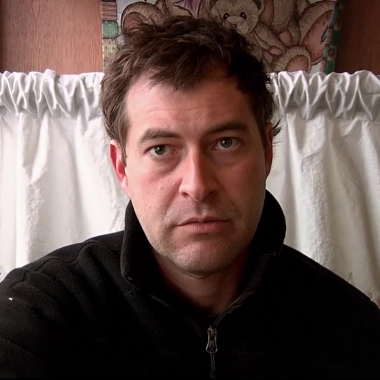
VINYARD: And this is your first time playing kind of a- I wouldn’t go so far as to call Josef a “villain”, but I’d say this is darker than most of the stuff I’ve seen you in.
DUPLASS: There’s some villainous qualities, yeah.
VINYARD: Was that something you really wanted to push?
DUPLASS: Yes. It was so fun for me. I wasn’t thinking “villain”, I was thinking “different”. I was thinking these desperate, needy, sociopathic tendencies. A Craigslist encounter gone totally weird. That was so freeing and exciting for me. I’m always trying to dial in the tone of drama and comedy in these dramedies that I make, and it requires a lot of precision, and I was ready to just be like *fart noise* go crazy with Josef. It was probably the most fun I’ve had acting.
PATRICK: It was really exciting, because I had never experienced that version of you. Experiencing that during the production of the film, while having to react.
DUPLASS: And sleep in the same cabin as me.
PATRICK: Exactly, and cook dinner together after we did our scenes. It definitely helped me in terms of being able to deliver a performance at the same time we’re making all these technical decisions.
VINYARD: Did you have experience as an actor?
PATRICK: No. I mean, I did community theater when I was like 12. I was Peter Pan when I was 12. Other than that, it was just jumping into the unknown.
VINYARD: You didn’t think too much about it?
PATRICK: I didn’t put up any resistance. Mark was the one who was like, “You should act in it with me too,” and I just said yes because I was excited to be going off and making something. The school that I went to…the experimental approach was not scary, it was the norm. Going into a movie like this, thinking about it from a formalist perspective, yeah, that’s something I could give in. You can only devote so much energy into something as you’re making it, but I thought that’s an aspect that I could give to this as well. And hopefully come off as real and true. It’s hard to be objective watching this movie, for me, having to watch both of us. Our wives watch this movie, and they’re just like, “You guys are the biggest dorks on the planet.”
DUPLASS: But they say that all the time anyway, so that’s alright.
PATRICK: Yeah, that’s the norm. But it’s heartening to have people actually respond to it.
DUPLASS: Crazy. It’s only been available on iTunes for a week. It’s crazy how many people have seen it, and how far reaching the appeal is, ‘cause I look at it and I think it’s kind of a niche movie. But people click into it. Then I remember, okay, there’s something inherently relatable about watching a movie like MISERY or FATAL ATTRACTION. It does share that DNA. I think that’s the link that is able to make this think broaden out.
VINYARD: And keeping it that simple is definitely a hook, because people can sit down and sort of not know anything-
DUPLASS: And very quickly understand what it is. Which is why the movie’s called CREEP and not PEACHFUZZ, so you can understand what it is before you go in.
PATRICK: It’s also a different experience where you watch this movie. We had the great experinece of playing it at film festivals and actually watching it in a big theater with people and actually hearing audible audience reactions. But then the way most people are going to be discovering this movie is at home streaming on whatever device their watching on. You’re just like the person in the room, basically. The audience member is sort of forced to engage with it.
DUPLASS: It’s fun to watch people interviewing me who I’ve been interviewing with for the past ten years on other movies, and they look at me differently after they’ve seen the movie. I can feel their energy shifting in the room.
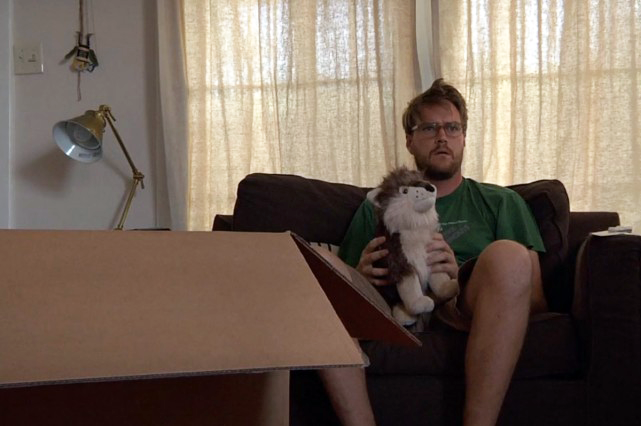
VINYARD: Really? *laughs* I wasn’t feeling anything, now I’m like, “Should I be looking for the masks?” (to Mark) You’ve been directing for like 10 years, but you haven’t directed anything besides TOGETHERNESS since JEFF WHO LIVES AT HOME. Two questions about that- I guess three, but we’ll save one for later. 1. Why have you been focusing on acting, and 2. how closely did you work with Patrick behind the camera? ‘Cause you’re not credited as a director, just a writer, but you guys shot alone together.
DUPLASS: This movie was an intense collaboration between three people, me, Patrick, and our editor and co-producer Chris Donlon. It was three of us up there making the movie. At the end of the day, it was always Patrick’s decision to do what he wanted to do with his movie. It was his movie. But we were just three kids trying to figure out how to make a movie. That’s not always the case in movies that I act in and produce.
To answer your question about why I’m not directing movies: we direct all 8 episodes of TOGETHERNESS. Over the past two years, I’ve directed sixteen episodes of television, and I produce that, I write all those with my brother, and I act in them. So that’s pretty much a full-time job. It’s just kinda the way life went. It wasn’t like, “I don’t wanna make movies anymore!” It was more like, “If I’m gonna do TV, I’m gonna do it right. I’m gonna control it. I’m gonna direct all these for a while and set the tone,” so that just left no time for it.
Then surprisingly, I’ve really gotten into my role as a producer. I didn’t think that was going to be part of my life. Mentoring young filmmakers, producing, and giving Patrick the opportunity to make THE OVERNIGHT and Lynn Shelton on her first movie and Colin Trevorrow on his first movie and Charlie McDowell. I love that energy of being with someone. I’m not very often called to do any ghost directing in those things. I’m good at setting them up, setting the structure. I’m there if they need anything, but very rarely is it called on me to jump in. It’s just really fun for me. I feel their appreciation, and it feels like a mutually beneficial relationship.
VINYARD: One movie that you produced that I just saw at SXSW was Hannah Fidell’s 6 YEARS. How’d you link up with her?
DUPLASS: We share the same agent. She showed me her movie A TEACHER when it first went to Sundance, and I really liked it. Met Hannah, became really friendly with her. I just have movies I think of that I’d always like to make. I think like a producer, I found out. To be perfectly honest, I was thinking of the movie DAYS OF WINE AND ROSES, which I really love. It’s a relationship tragedy. I was thinking how young adult stories are very popular in the zeitgeist, so I was like, “If there was a movie that felt like DAYS OF WINE AND ROSES but it was the young adult world, and it had naturalism and young actors, I think that it could be made cheaply and it could be really, really good.” So I called Hannah, and I said, “This is what I wanna do, I want to make a movie. I’ll pay for it, I’ll produce it, I’ll foster you, get you goin’.” And she said “Great.” We built the story together, and she went off and made it. It was a very cool experience.
VINYARD: Are you still working on A TEACHER as a TV show?
DUPLASS: Yeah. I was actually just e-mailing, setting up a call for that. We’re still in development with that at HBO.
VINYARD: I’m a big fan of the film, so I’m looking forward to that. You guys moved on to THE OVERNIGHT, (to Patrick) your second movie. Can you talk about the difference in experience, ‘cause that’s obviously more of a traditional, scripted kinda movie?
PATRICK: It was different. But it was also great, because having the experience of having made CREEP in this sorta way where you’re jumping off a cliff with someone, essentially. The whole movie’s improvised, we only had a five-page outline. Leaving that stuff up to chance, but yet there’s still there’s structure around it. Knowing what the plot points are and having fleshed that part of it out helps.
With THE OVERNIGHT, it was so nice to be able, even though we had a full script, to allow the actors to veer off that when they needed to, then to go back to the script as an anchor at the same time. Then when you’re working with actors at the level that I was getting to work with in that movie, who have so much experience, those performers only benefit from this approach. I approached them as the director, but I treat them as my collaborators. I truly value their input when it comes to the characters and getting everything right tonally, I’m not trying to force my original idea of what the movie is going to be on them.
I feel like with CREEP, I was able to give in to what the movie wanted to be while I was making the movie. I know normally that freedom is hard to find, and it’s nice that it exists at this level. That was really cool, to be able to make deliberate choices that would normally seem scary, but being able to trust myself having gone through the experience of making CREEP.
VINYARD: Was it easier or harder of an experience than CREEP?
PATRICK: At the end of the day, it was easier.
DUPLASS: Shorter.
PATRICK: Yeah it was shorter. With CREEP, it was a two-year-long process. It was the first time I’d ever worked on a narrative project before. I’d never even made a narrative short before.
DUPLASS: There was so much unknown too. So much swimming in the sea of infinite possiblity. “What movie will it be, what should it be?” In many ways, it shoulda been like your seventh movie after you were structured for a long time, and wanted to just go out and see what happened. ‘Cause it’s a hard movie to make for your first movie. Easy for me, ‘cause it was fun.
PATRICK: And that was nice, to be able to have Mark to reassure me at the darker moments, like “Fuck, do we really have to go back in and fix this thing?” And he’s like, “Yes, you have to fix it, because it can be fixed, and that’s our responsibility, and we have the time and the wherewithall to do it.” Whereas with THE OVERNIGHT, it was like I’d been playing basketball by myself and all of a sudden I got the NBA all-stars with me.
DUPLASS: You can pass the ball.
PATRICK: It was ocol for the performers and my producer on that movie, Naomi Scott, to have someone who was as excited about involving everyone and open to making something that was more organic. These are people…Adam was on PARKS & REC for many years, and I’m sure they got into a very specific groove on that, and it was exciting for him to make something that was just off-the-cuff and weird and fun, and get back to the core elements of filmmaking.
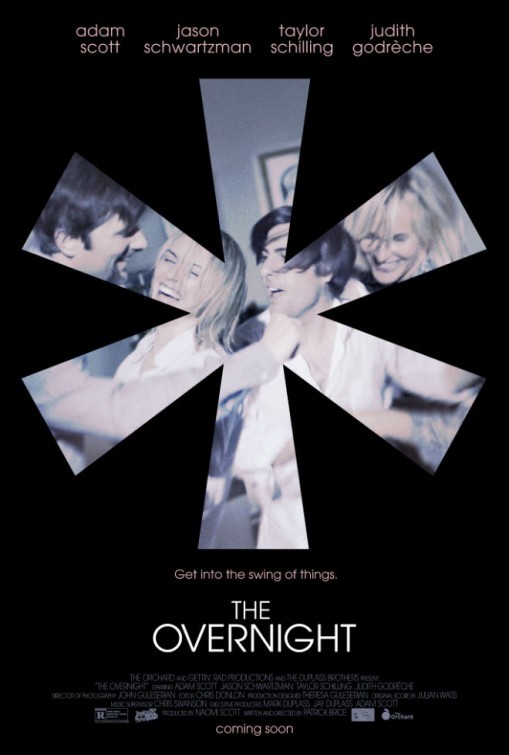
VINYARD: (to Mark) What was your level of involvement with THE OVERNIGHT?
DUPLASS: Very much like I am as a producer. We went back up the cabin where we shot CREEP. We helped structure the story in a way that it was a size and scope that it could be produced by my company. I helped bring Adam and Naomi onboard, so Naomi could really run the movie day-to-day. A couple of connections with several of the cast members. Then, when the movie was really on it’s feet and ready to go, I backed away and let the thing run itself. Then I tend to come in towards the end and help finalize the editorial, and I’m heavily involved with the sales of the movie at Sundance and stuff like that. A lot of the beginning to set it up and a lot at the end to close it out. The middle and the creative stuff as its being shot is all on those guys, usually.
PATRICK: CREEP was like a year of post, essentially, a year of doing test screening and really-
DUPLASS: Getting our asses handed to us.
PATRICK: Yeah. And really getting our egos shredded, and learning how to take a poll of the response and how to weed out the more emotional responses.
VINYARD: There’s always a fringe element.
DUPLASS: Gotta get to that median.
PATRICK: Mark’s really good at that, and that’s what was also helpful with THE OVERNIGHT, and what made us able to trust what we did a little bit more. We had the same process with THE OVERNIGHT, but we only screened it twice. We all knew what was wrong and what we had to dial in and what we were capable of fixing.
DUPLASS: And it came together quickly.
VINYARD: When you were screening CREEP, what do you think people particularly took umbrage with?
DUPLASS: There was less umbrage and more clamoring for the darkness. It was like, “This is working. This PEACHFUZZ thing you have works, but this stuff over here is so exciting, these dark looks and silences and this tension. It’s new, it’s different, it’s not happening in horror right now, and resetting all the loud jump scares and gore happening, and we wanna see that.”
PATRICK: Scott Stewart was the one- and I keep going back to this quote- who said, “You guys are either gonna make HAROLD & MAUDE or you’re going to make MISERY, and you have to figure out which you wanna make.” And we pushed it more towards MISERY, at the end of the day.
VINYARD: Like you said, it’s not a tone that people usually go for, so it ends up being more relatable and real, and ends up getting you at a deeper level.
DUPLASS: That’s what we hoped.
VINYARD: And I love that there are three jump scares before anything actually happens, just to be like, “Is this funny? Is this a comedy?”
DUPLASS: “What are we doing?”
VINYARD: Was all that in the original cut?
DUPLASS: No. There were some, not all of them. At one point, we had more that we had to take out towards the end.
PATRICK: And that was fun to be able to play with that, too. It’s a literal jump-scare, and we knew that the hardcore horror fans are ready for that, and to actually give it to them over and over again-
DUPLASS: That was fun. That’s what was fun about bringing in Blumhouse, ‘cause they’re so knowledgable about the expectations. Those guys were really helpful in giving us a barometer for that.
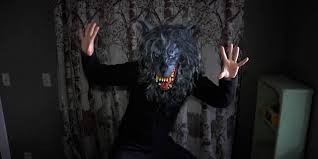
VINYARD: Was the mask in it from the beginning?
DUPLASS: Oh yeah.
VINYARD: Was that the scariest thing that was in there from conception?
DUPLASS: Probably, yeah.
VINYARD: How’d you get the mask?
DUPLASS: We dug deep online for that. That took a while. We found it in the attics of Ebay.
PATRICK: We wanted something that was goofy in a certain way, but also fuckin’ scary.
VINYARD: Did you paint it up at all, but is that how it came?
DUPLASS: Only a little touch-up. it was pretty close.
VINYARD: What about the cabin? The cabin’s such a big part, and you guys said you went back-
DUPLASS: Yeah, we had access to the cabin up there. We know someone who owns it.
VINYARD: Was it just a matter of convenience, choosing the location?
DUPLASS: Yes. *laughs* We have this, let’s shoot here.
CREEP is currently available on iTunes and Netflix.
